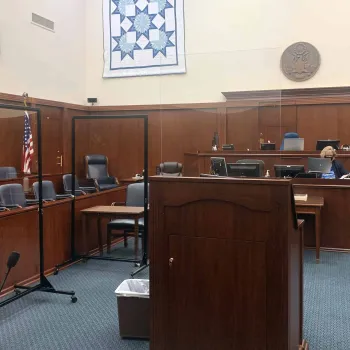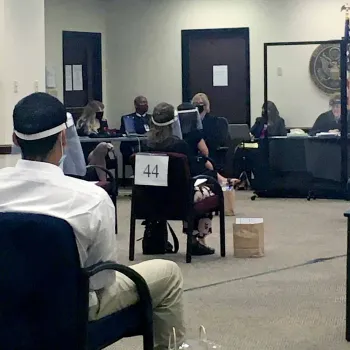Idaho may be known for its mountainous landscape and independent spirit, but in federal courtrooms in that state, you are required to wear a face mask. And it better be covering your nose and mouth, per court order.
As a law-abiding citizen, U.S. District Judge B. Lynn Winmill is usually seen wearing his.
“The minute I walk away from my desk, I put my mask on,” the judge said.
Winmill is among a small group of judges around the country who have presided over jury trials during the pandemic. The number is growing as the backlog of criminal cases becomes an increasing concern among courts acutely aware that defendants are entitled to a fair, impartial, and timely trial. The law also guarantees Americans a right to a jury that is representative of a cross-section of the community.
That means that courts have to convince prospective jurors that it’s safe for them to come back into courthouses.
In early June, Winmill went forward with a methamphetamine distribution case after meticulous planning to reduce health risks. Plexiglass screens were set up around the witness stand and the jury box. Chairs were added to provide exactly six feet of space between each juror. A vacant law library was converted to a spacious break room where jurors could be spaced 10 feet apart. Food was brought in so that jurors did not have to take risks at mealtimes.
As an added measure of caution, Winmill increased the level of fresh air circulating in the courtroom, based on advice from an epidemiologist hired to evaluate the court’s safety protocols.
“I would not have conducted the trial if I thought anyone, including myself, was subject to becoming infected. I felt very comfortable that we could do it safely,” he said.
Similar measures have been adopted by other courts in the hope of reassuring local communities that jury service does not pose a health risk. Anticipating a return to jury trials, some courts have posted public service announcement-style messages on their websites to explain their new safety protocols.
Overseeing one of the first jury trials during the pandemic, involving a defendant charged with felony possession of a firearm, Chief District Judge Barbara M.G. Lynn said she began by imagining every step in the trial scheduled to take place in her Dallas courtroom in the Northern District of Texas.
“I didn’t want to turn the courtroom into a fortress,” she said. “But at every point, we tried to construct what we would need to do to enhance safety.”
Lynn excused prospective jurors in vulnerable categories, such as those who were elderly or had health conditions that made them more susceptible to contracting COVID-19, the illness caused by the coronavirus.
During jury selection, groups of only 16 people were interviewed by the attorneys at a time. They were assigned numbered seats six feet apart, and each person received a kit with a face shield, cleaning supplies, a water bottle, a disposable badge, and instructions for social distancing.

The floor was marked with stickers to show trial participants where to wait.
All participants were required to wear face masks or shields, except witnesses during their testimony. Rolling plexiglass screens shielded participants from each other and witnesses were led along routes through the courtroom that kept them apart from jurors, who were seated, not in the jury box, but in the spectators’ gallery, with just two per row.
Still, Judge Lynn wondered whether she may have missed something. At the end of the trial, which ended in an acquittal, she asked the 14 jurors to fill out a form anonymously conveying their views.
Typical of the responses was this comment from a juror: “The health and safety measures employed were very well organized and could not have been any better.”
“I felt safe and comfortable,” another juror said.
No juror expressed fear of having been exposed to the coronavirus, although one juror suggested that the court in the future pay for parking because so many people have lost jobs or been furloughed during the pandemic.
U.S. District Judge Karen K. Caldwell was presiding over a major drug trafficking case in her Lexington courtroom when COVID-19 numbers began to spike in Kentucky in March.
Before long, courthouses were shuttering. Chief District Judge Danny C. Reeves issued an order delaying all cases in the Eastern District of Kentucky except those currently underway. He left the decision whether to continue the proceedings to the individual presiding judges.
For Judge Caldwell, it was not an easy call.
“This was a massive case,” she recalled, involving four defendants charged in one of the largest drug seizures in state history.
“It had been pending for two years. The defendants were from California, and two of the lawyers were from California. You worry about evidence getting stale with the passage of time, and we had spent a lot of time getting a jury that could be available for at least five weeks,” she said.
“We feared that if we took a long recess, the situation would only grow worse and we would be facing a mistrial.”
So Caldwell rearranged her courtroom to allow for six-foot distancing between the jurors and other participants. Three large rooms were reserved so that jurors could spread out on their breaks.
Read the Series
This is the third in a series of articles about how federal courts are working to recover from the COVID-19 crisis.
Next in this series: Grand juries carry on during the pandemic.
The judge also took the highly unusual move of conducting another voir dire-like session with the jurors, having them fill out a questionnaire that explained the safety measures and discussing with each of them any concerns about risks. Anyone who felt threatened or became sick would be excused.
“To a person, they all wanted to continue,” Caldwell said. “It was really amazing. They knew the case. They had already sacrificed a lot of time.”
The trial resumed, although with adjustments along the way.
Two nurses serving as jurors noticed that witnesses steadied themselves with a ledge while ascending to the witness chair. They suggested that it be sanitized with disinfecting wipes after every use just like other surfaces in the courtroom.
“I think the pandemic kind of united them. They really operated as a team,” Judge Caldwell said.
Judge Lynn also was impressed by the jurors’ commitment during the trial in Dallas.
“One of the most heartening aspects of the experience was that all of these people showed up, willing to do their duty as jurors,” Lynn said. “I had a nagging thought at the back of my mind, ‘Would people actually appear under these circumstances?’ They did, and they did so enthusiastically. They were willing to do their duty as citizens.”
Subscribe to News Updates
Subscribe to be notified when the news section is updated.




